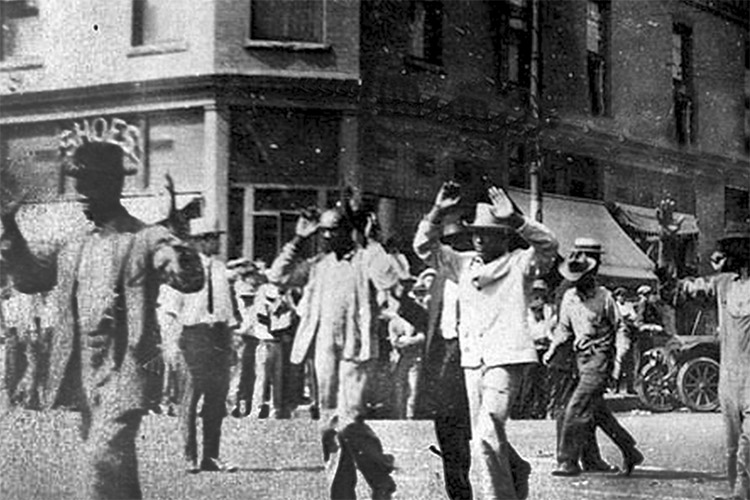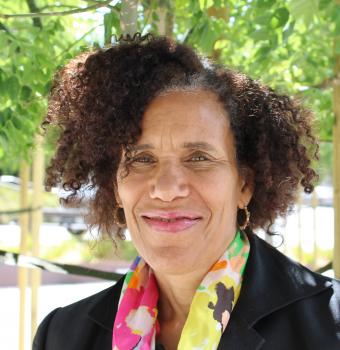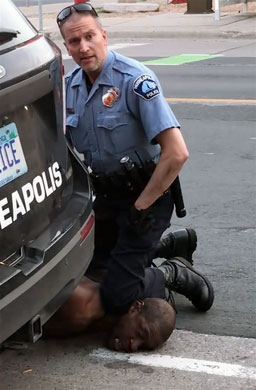Derek Chauvin’s defense is grounded in centuries of dehumanizing Black bodies
Berkeley expert says the impact of racial health disparities, white supremacy must be considered when contextualizing the Derek Chauvin trial.
April 16, 2021

Throughout American history, Black people have been dehumanized because of white supremacist ideology, says UC Berkeley public health professor Denise Herd. This has led to racial health disparities and punitive police practices that must be considered when contextualizing the Derek Chauvin trial. (Photo via McFarlain Library, University of Tulsa)
For three weeks, defense attorneys in the Derek Chauvin trial have argued that George Floyd, a 46-year-old Black man, died due to his drug intake and a heart condition and not because Chauvin, a white Minneapolis police officer, knelt on his neck for more than nine minutes on May 25, 2020.

UC Berkeley Public Health Professor Denise Herd.
But those arguments are rooted in centuries of looking at the health and well-being of Black people as different — and less valuable — than that of white people, said UC Berkeley public health professor Denise Herd. And this underscores the way law enforcement views Black bodies and leads to punitive police practices that justify the killing of Black people.
“In American consciousness, law enforcement is one big locus that has historical ties to racist domestic terrorist groups that do not value the lives, health or well-being of Black people,” said Herd, who is also associate director of Berkeley’s Othering and Belonging Institute. “And that mentality is what allows somebody to have their knee on another human being’s neck for more than nine minutes — actively killing them in front of their peers and the public.
“The only reason why these health conditions become important during a trial is that police are looking to justify murder.”
Berkeley News spoke with Herd recently about the trial and how Chauvin’s defense has used arguments grounded in white supremacy to justify Floyd’s death.
Berkeley News: Do you feel the argument that Floyd died from issues with his heart, and not from Chauvin’s actions, holds water?
Denise Herd: There were medical experts that testified during the trial stating that a healthy person with that kind of pressure to the neck would have died, as well. And that defense kind of parallels the Eric Garner case, where, in 2014, Garner, a Black man in New York City, died from a chokehold a police officer put him in. Garner had asthma and a heart condition, and there were arguments that those were the reasons he died, as well.
A grand jury dismissed the charges, and the case never went to trial because of that.
Diseases like diabetes, asthma and heart disease are rampant in Black communities. So, to use that as an excuse in these types of cases further emphasizes the racial disparities present in racial and ethnic minority communities, and in the way law enforcement views Black bodies.
In both the Garner and Floyd cases, you have Black men who are considered bigger in stature. And during the Chauvin trial, they have referred to Floyd’s size often — he was 6’4 and over 220 pounds — and that highlights the perception that Black men are seen as threatening, just because of the strength or size of their bodies. That they need to be violently restrained because of this.
The only reason why these health conditions become important during a trial is that police are looking to justify murder. To prove that their actions didn’t cause that person’s death.
What about the argument that Floyd’s drug intake at the time was more of a contributor to his death?
In America, people that are using drugs are often demonized, but many of them are going through mental health issues. That, in itself, may increase their chances of having a violent encounter with police.
Moreover, there is research that shows experiencing racism and police brutality can contribute to stress, anxiety and mental illnesses.
The war on drugs in the 1980s and beyond was really a war on the poor and on people of color. And the view wasn’t that this was a public health problem. It was the problem of “deviant individuals” in poor and Black communities.
That has all contributed to this police mentality and response to people who use drugs. It discredits the victims who have been killed by police and has allowed police to get off in cases like this.
In the video of Floyd dying, we see and hear him call out in pain, though Chauvin does not respond and continues to kneel on his neck. Chauvin’s defense has said that the chokehold is approved and taught during police trainings. Is there a disconnect between police practices and the type of physical restraint a human’s body can take?
Yes, I think there is. And we see that force being used disproportionally on Black people and other people of color.
In some of these interactions between Black people and police, there is reference to a Black man’s size and strength being a factor in having to use excessive force. But there are also incidents where smaller Black women or older children are being handcuffed, pepper-sprayed or violently thrown on the ground, as though there is a disregard for their humanity.
These punitive police practices could be linked to medical perspectives and biases that Black physiology is somehow different from white people and others.”
– Denise Herd
It goes back to this punitive take on Black people, that they constantly need to be punished aggressively. These punitive police practices could be linked to medical perspectives and biases that Black physiology is somehow different from white people and others.
There’s documentation that cites medical students still ascribe to the belief that Black people have “thicker skin” and don’t feel pain as much. That perspective has contributed to the under medication of Black people and has existed all the way back to slavery.
A few months ago, a Black doctor in Indianapolis died from COVID-19 after posting on social media that she was trying to get treated, and the hospital she was admitted into wouldn’t medicate her enough for her pain.
Why is it important to understand these public health perspectives and how they relate to the criminal justice system, in the context of this trial and other similar cases?
What Chauvin did was like those lynchings of Black people that the public used to watch and enjoy. And police were a part of those events, too.
What gives someone the right to exercise that kind of force and still feel justified?
In American consciousness, law enforcement is one big locus that has historical ties to racist domestic terrorist groups like the Ku Klux Klan. And even now, in some jurisdictions, there’s integration between white supremacist groups and the police.

Police Officer Derek Chauvin kneeled on George Floyd’s neck for more than nine minutes. (Image via Wikipedia)
Those groups do not value the lives, or health, of Black people the same as others.
You’ve got police using excessive force and acting as executioners in Black communities. And that attitude developed in the post-reconstruction period when African Americans were no longer slaves. Their value dropped in society because they were no longer earning money for somebody else.
There was a sense that you could work them to death without worrying about their health or well-being, without seeing them as human beings.
And that mentality is what allows somebody to have their knee on another human being’s neck for more than nine minutes — actively killing them in front of their peers and the public.
